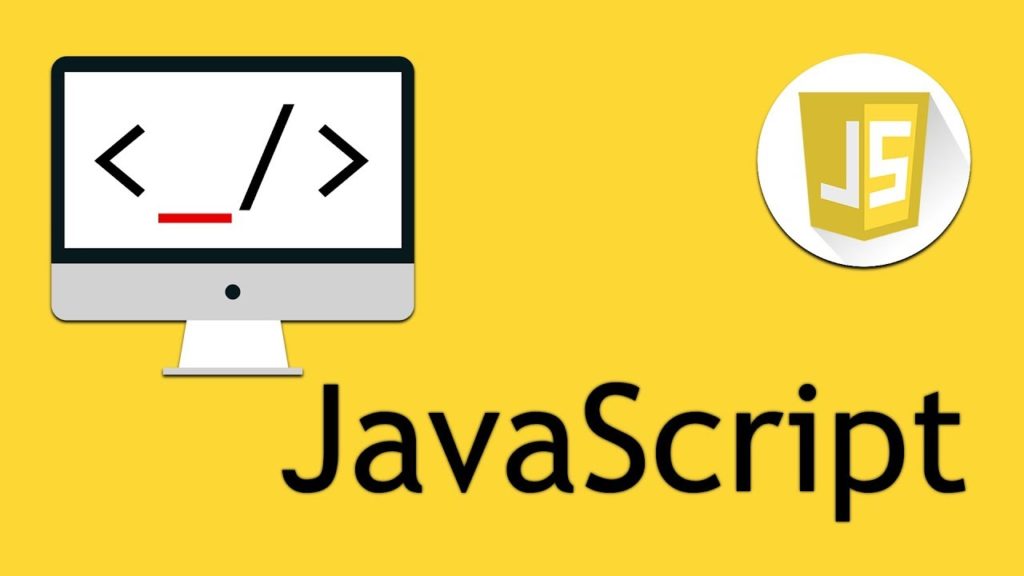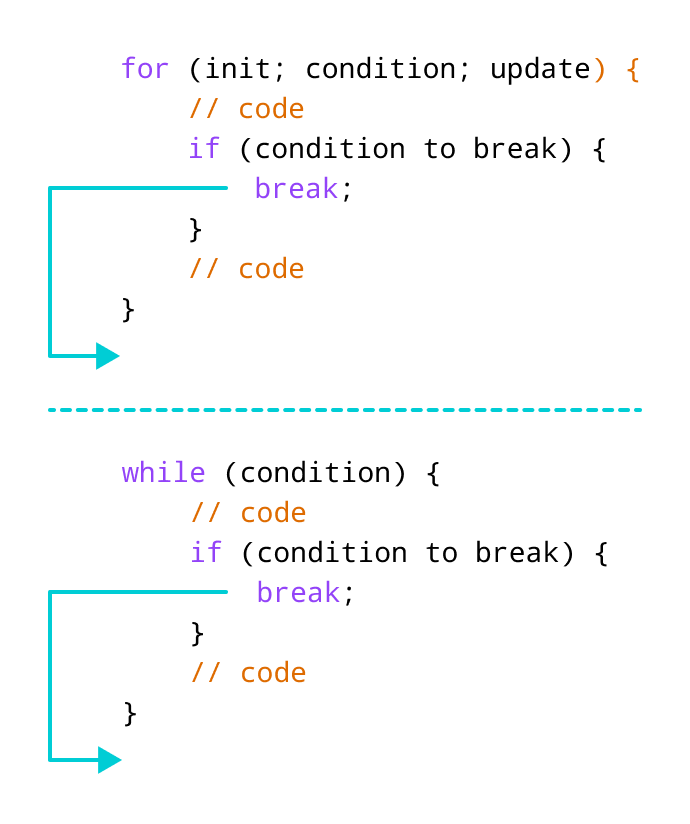
(JavaScript Tutorials for Beginners)
In this end-to-end example, you will learn – JavaScript tutorials for Beginners – JavaScript break Statement.
JavaScript break Statement
In this tutorial, you will learn about the break statement with the help of examples.
The break statement is used to terminate the loop immediately when it is encountered. The break statement is also used to terminate the switch statement.
The syntax of the break statement is:
break [label];Note: label is optional and rarely used.
Working of JavaScript break Statement

Example 1: break with for loop
// program to print the value of i
for (let i = 1; i <= 5; i++) {
// break condition
if (i == 3) {
break;
}
console.log(i);
}Output
1 2
In the above program, the for loop is used to print the value of i in each iteration. The break statement is used as:
if(i == 3) {
break;
}This means, when i is equal to 3, the break statement terminates the loop. Hence, the output doesn’t include values greater than or equal to 3.
Note: The break statement is almost always used with decision-making statements. To learn more, visit JavaScript if…else Statement.
To learn more about for loop, visit JavaScript for loop.
Example 2: break with while loop
// program to find the sum of positive numbers
// if the user enters a negative numbers, break ends the loop
// the negative number entered is not added to sum
let sum = 0;
while(true) {
// take input again if the number is positive
number = parseInt(prompt('Enter a number: '));
// break condition
if(number < 0) {
break;
}
// add all positive numbers
sum += number;
}
// display the sum
console.log(`The sum is ${sum}.`);Output
Enter a number: 1 Enter a number: 2 Enter a number: 3 Enter a number: -5 The sum is 6.
In the above program, the user enters a number. The while loop is used to print the total sum of numbers entered by the user.
Here the break statement is used as:
if(number < 0) {
break;
}When the user enters a negative number, here -5, the break statement terminates the loop and the control flow of the program goes outside the loop.
The while loop continues until the user enters a negative number.
To learn more about while loop, visit JavaScript while loop.
break with Nested loop
When break is used inside of two nested loops, break terminates the inner loop. For example,
// nested for loops
// first loop
for (let i = 1; i <= 3; i++) {
// second loop
for (let j = 1; j <= 3; j++) {
if (i == 2) {
break;
}
console.log(`i = ${i}, j = ${j}`);
}
}Output
i = 1, j = 1 i = 1, j = 2 i = 1, j = 3 i = 3, j = 1 i = 3, j = 2 i = 3, j = 3
In the above program, when i == 2, break statement executes. It terminates the inner loop and control flow of the program moves to the outer loop.
Hence, the value of i = 2 is never displayed in the output.
JavaScript Labeled break
When using nested loops, you can also terminate the outer loop with a label statement.
However labeled break is rarely used in JavaScript because this makes the code harder to read and understand.
If you want to learn more about the labeled break statements, visit labeled break.
The break statement is also used with switch statements. To learn more, visit JavaScript switch statement.
Disclaimer: The information and code presented within this recipe/tutorial is only for educational and coaching purposes for beginners and developers. Anyone can practice and apply the recipe/tutorial presented here, but the reader is taking full responsibility for his/her actions. The author (content curator) of this recipe (code / program) has made every effort to ensure the accuracy of the information was correct at time of publication. The author (content curator) does not assume and hereby disclaims any liability to any party for any loss, damage, or disruption caused by errors or omissions, whether such errors or omissions result from accident, negligence, or any other cause. The information presented here could also be found in public knowledge domains.
Learn by Coding: v-Tutorials on Applied Machine Learning and Data Science for Beginners
Latest end-to-end Learn by Coding Projects (Jupyter Notebooks) in Python and R:
All Notebooks in One Bundle: Data Science Recipes and Examples in Python & R.
End-to-End Python Machine Learning Recipes & Examples.
End-to-End R Machine Learning Recipes & Examples.
Applied Statistics with R for Beginners and Business Professionals
Data Science and Machine Learning Projects in Python: Tabular Data Analytics
Data Science and Machine Learning Projects in R: Tabular Data Analytics
Python Machine Learning & Data Science Recipes: Learn by Coding
R Machine Learning & Data Science Recipes: Learn by Coding
Comparing Different Machine Learning Algorithms in Python for Classification (FREE)
There are 2000+ End-to-End Python & R Notebooks are available to build Professional Portfolio as a Data Scientist and/or Machine Learning Specialist. All Notebooks are only $29.95. We would like to request you to have a look at the website for FREE the end-to-end notebooks, and then decide whether you would like to purchase or not.